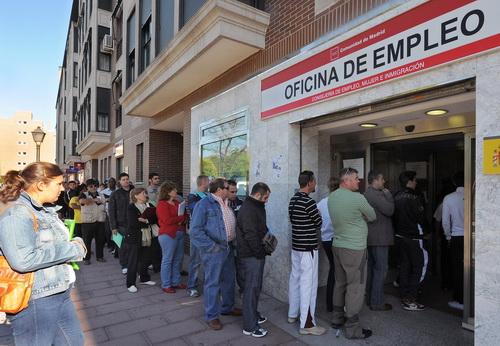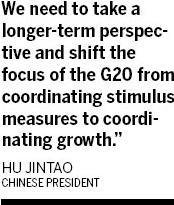Final declaration calls for steps to get 'full return to growth'
TORONTO - Leaders of the G20 nations and organizations arrived in Toronto with divergent agendas. But they ended their two days of discussions with the "spirit of unity" that Chinese President Hu Jintao called for in his address to the G20 summit.

Jobseekers line up at an employment oi ce in Madrid, Spain. The G20 summit said that unemployment in many countries remains at unacceptable levels . [DENIS DOYLE / BLOOMBERG]
The final document - the G20 Toronto Summit Declaration - leaves room for the economies to maneuver according to the different circumstances of their development to tackle different economic challenges. These include sovereign debt, government budget deficit, lax financial regulations and some advanced economies' concerns over the flexibility of currency exchange rates.
The objective is to "ensure a full return to growth with quality jobs, to reform and strengthen financial systems, and to create strong, sustainable and balanced global growth", reads the declaration that took 45 hours of negotiations before the leaders reached a consensus on Sunday.
The declaration "puts some of the meat on the bones of the framework of strong, sustainable and balanced growth", Canadian Prime Minister Stephen Harper, who is also the chair of the G20 summit, said at the press conference after the summit closed.
The advanced economies pledged in the declaration that they would cut their deficits by 50 percent by 2013 and stabilize or reduce the ratios of government debt to GDP by 2016.
Obama said that the US would be able to fulfill its commitment to halve its budget deficit in three years.
"European officials took the G20's commitment to cut deficits as a clear sign that the rest of the world had come around to Europe's point of view," Reuters reported.
"The EU came to Toronto with a clear agenda. The summit's results reflect widespread convergence around Europe's approach," Reuters quoted the European Union officials' statement as saying.
As to stimulus exit, the declaration recognized the different approaches that countries would take according to their needs. It uses the euphemism "growth friendly" fiscal consolidation to try to make sure that no drastic budget cuts hurt economic recovery.
"There is a risk that synchronized fiscal adjustment across several major economies could adversely impact the recovery," the declaration said.


"We need to take a longer-term perspective and shift the focus of the G20 from coordinating stimulus measures to coordinating growth, from addressing short-term contingencies to promoting long-term governance and from passive response to proactive planning," Chinese President Hu Jintao said in his address.
The US clearly is also worried. "We can't all rush to the exit at the same time," Obama told the press, adding that countries that have surpluses should think about how to contribute to growth and boost demand.
The declaration called for measures including enhancing social safety nets, pushing for corporate governance reform, developing financial markets and spending on building infrastructure, as well as "greater exchange rate flexibility in some emerging markets".
To address the global economic imbalance, the declaration follows the prescriptions of most leading economists such as Nouriel Roubini that advanced deficit countries should save more and increase their export competitiveness while surplus economies should shift their economic growth model from reliance on exports to boosting domestic consumption.
China has repeatedly expressed its concerns over increased trade protectionism.
The leaders agreed to extend the Washington "standstill" for another three years, requiring countries to refrain from introducing new protectionist measures.
All participating economies agree that the G20 summit is now the primary forum for international economic cooperation, with the leaders celebrating the world's fast and massive response to the worst global financial crisis since the Great Depression in 1929.
"We've brought ourselves back from the brink and begun to move forward with economic recovery," US President Barack Obama said.
However, leaders acknowledged that "the recovery is uneven and fragile, unemployment in many countries remains at unacceptable levels and the social impact of the crisis is still widely felt".
The International Monetary Fund and World Bank each issued an assessment report in which they stated that the world would do better if economies continue reforms to achieve sound finances, rebalance global demand and strictly regulate their financial systems.
That is, "the global output would be higher by $4 trillion; tens of millions more jobs would be created; even more people would be lifted out of poverty; and global imbalances would be significantly reduced", the declaration said.





